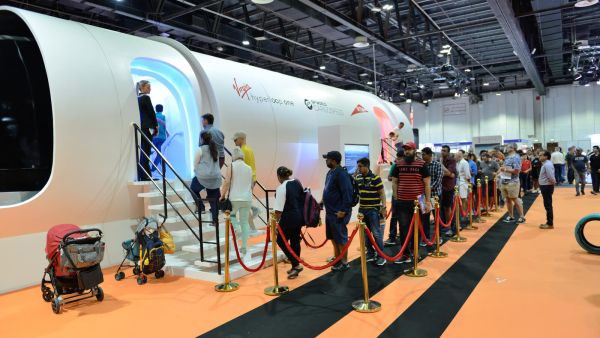Innovation never stops, especially in providing humans with new experiences and easier solutions to the most crucial services they need and use on a regular basis. For decades, experimental experts have been trying to come up with new transportation means that can potentially beat the exhausting and time-consuming air travel. Recent successes show that we might be closer than ever to the newest and fastest means of travel humans have yet to try.
Virgin Hyperloop has completed the first test of its high-speed transportation technology with humans on board. The company's hyperloop pod traveled 500 meters (about 1,640 feet) and reached speeds of 100mph. https://t.co/acsBnDKwjx pic.twitter.com/JyMswVnY01
— CNN (@CNN) November 11, 2020
In the 2018 UAE Innovation Month, Emirati officials revealed the first hyperloop prototype in cooperation between the Dubai Roads and Transport Authority and the American-based Virgin Hyperloop One company. The hyperloop that has been tested with different speeds up to 1200 km/h will be able to offer services for over 5000 passengers each hour. Initial plans include a 12-minute route between Dubai and Abu Dhabi, to make up for the 90-minute trip in regular cars.
This week, hyperloops have been back into discussions after Virgin Hyperloop successfully completed its first-ever trip with passengers, in the desert of Nevada, transferring a group of people throughout a 500m test track in 15 seconds. with speed reaching up to 172km/h.
Two passengers have ridden in a @virginhyperloop pod in a test that has made transportation history. Read my thoughts on why I’m so excited about Virgin Hyperloop and its potential to change how the world moves around: https://t.co/4PRA6PN8B1 pic.twitter.com/MXd2ZC9CmX
— Richard Branson (@richardbranson) November 9, 2020
But, what is a hyperloop? and how revolutionary is it?
Although still widely regarded as a futuristic means of travel that might require more decades of research and trials, a hyperloop is simply a transportation system where human-loaded pods which look quite similar to capsules are pushed through a system of tubes with reduced pressure so pods fly at the maximum speed possible, from an point A to point B.
Compared to the maximum speed available to airplanes which nears 804.672 km/h, hyperloops will help humans save a lot of time and effort while traveling around. However, one of the main challenges to the development of this new near fantasy-like system is its need for thousands of kilometers of well-built tubes on the ground, requiring huge work on the part of infrastructure and construction developers.
Who takes credit for developing hyperloops?
The internet will instantly tell us that it's Elon Musk's idea, considering that he was the very first person to mention it publicly in 2012, suggesting that a solar-powered hyperloop can offer a transportation system that is twice as fast as planes.
Yet, it's too early to attribute the whole system to anyone or any company before we actually see a successfully working accident-free system in reality.
Do you think traveling through a hyperloop is going to be a practical means of transportation anytime soon? Where will hyperloops be needed the most and when is it going to be ready for human everyday use?







